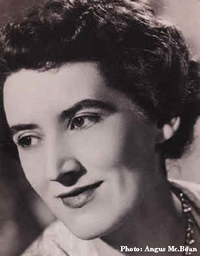
Shortly before her death in 2006, British pianist Joyce Hatto released a series of acclaimed CDs on Concert Artist Recordings, a label owned by her husband, William Barrington-Coupe. Though she was battling cancer, Hatto’s output was both prolific and technically dazzling. “Even in the most daunting repertoire, her poise in the face of one pianistic storm after another is a source of astonishment,” wrote critic Bryce Morrison; Jeremy Nicholas called her “one of the greatest pianists Britain has ever produced.”
But skepticism began to grow on the Internet, and in February 2007 Gramophone editor Jed Distler put Hatto’s recording of Liszt’s Transcendental Études into this computer and was surprised to find that iTunes identified it as the work of Hungarian pianist László Simon. On investigating, recording engineer Andrew Rose found that Hatto’s recordings of the Chopin etudes appeared to match those of Italian pianist Carlo Grante but had been manipulated electronically.
Barrington-Coupe defended the recordings at first, but finally confessed to Robert von Bahr, head of Sweden’s BIS label. In all, more than 100 recordings had been falsely attributed to Joyce. Barrington-Coupe maintained that she had been unaware of the fraud, though some critics dispute this; Von Bahr considered suing him but decided against it, considering the affair “a desperate attempt to build a shrine to a dying wife.”
Whatever the motive, the episode does seem to indict the judgment of some celebrated music critics. “Does it affect the way someone perceives a performance if the pianist is a healthy, respected but lowish-profile middle-aged man, or a dying, unjustly neglected British heroine?” asked the Independent. “Maybe it shouldn’t, but the extent to which it does has never been clearer.”
